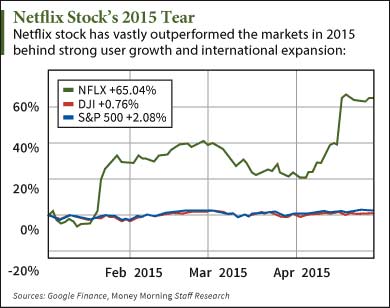

"Smart people question whether they will ever make money," Pachter said of the challenges facing Netflix in streaming. Netflix will release its second-quarter results on July 24. The obligations have been piling up so quickly that Netflix expects to post an annual loss this year, the first time that has happened since 2002. Netflix ended March with about $800 million in cash.
NETFLIX STOCK MOVIE
The popularity of streaming could prompt movie and TV studios to demand even higher fees.Īs of March 31, Netflix had signed contracts that will require the company to pay $3.6 billion in licensing rights during the next five years, including $730 million by next April. Internet video hasn't been as profitable so far primarily because Netflix has had to spend heavily to secure the licensing rights to show movies and TV shows online whenever subscribers want to watch them. Netflix's commercial-free Internet video library now gets watched more frequently than most TV networks, which depend on ads and cable fees.ĭespite the popularity, Netflix hasn't proven that it will be able to make as much money streaming video over the Internet as it has delivering rented DVDs through the mail during the past decade. That translates to a monthly average of about 38 hours per subscriber, up from 28 hours late last year. Netflix, which is based in Los Gatos, Calif., says its streaming subscribers worldwide watched more than 1 billion hours of Internet video in June. Just as Hastings envisioned, the streaming service is becoming increasingly addictive as Netflix adds more titles. The bulk of those subscribers now pay only for Internet streaming. subscribers, more than the 24.6 million the company had just before the price hike was announced. As of March 31, Netflix had 26.1 million U.S.

subscribers during the quarter spanning the price hike and the Qwikster announcement, but the company has since bounced back from that setback. The ensuring uproar caused Hastings to quickly scrap Qwikster, but by then the damage had been done. That switch would inconvenience subscribers who still wanted both DVDs and Internet streaming by requiring them to maintain two separate accounts on different websites. With the price change, Netflix split video streaming and DVD rentals into separate services that raised the monthly minimum cost for both to $16.Īs if the higher prices weren't aggravating enough, Netflix CEO Reed Hastings infuriated subscribers even more a couple months later with a ham-handed apology that dropped another bombshell: The company intended to spin off the DVD service into a separate website called Qwikster. The shortcoming wasn't a problem until last year because Netflix had been bundling DVDs with unlimited video streaming in a package that cost as little as $10 per month.

NETFLIX STOCK LICENSE
That's because studios generally have refused to license their more recent material for online viewing, leaving Netflix's Internet video library with a less comprehensive selection than what's available on DVD. Promoting Internet streaming over DVDs also helps Netflix save money on postage as it mails fewer discs.īut DVDs still appeal to subscribers who want to watch the latest movie releases. Preparing for the day when DVDs become obsolete makes good business sense as the ubiquity of high-speed Internet connections makes it easier and more convenient to watch video online. The company increased its prices by as much as 60 percent as part of an effort to phase out its DVD-by-mail rental service and raise more money to license TV shows and movies for its Internet video library. The stock gained $3.33, or 4 percent, to close Thursday at $84.97. But even after a recent rally, its stock remains more than 70 percent below its peak price of nearly $305 about a year ago, largely because of concerns about what Netflix has been spending to attract and retain subscribers. has bounced back this year to revive its subscriber growth. The unexpected twist that Netflix unveiled a year ago Thursday triggered mass customer cancellations and a sell-off in its stock, which has wiped out more than $11 billion in shareholder wealth.


 0 kommentar(er)
0 kommentar(er)
